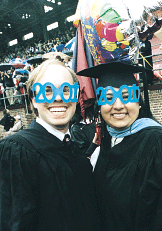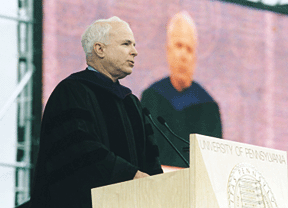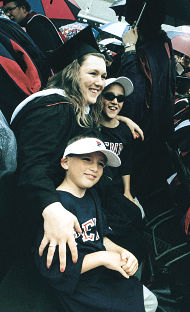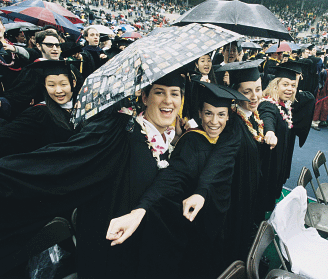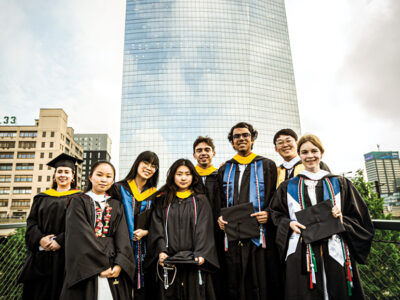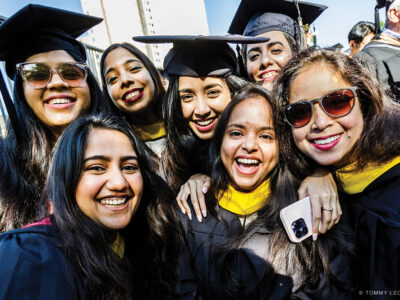Photography by Tommy Leonardi C’89
Sidebar | And the Honorands Are …
It turned out that the parents of the Class of 2001, who had worked so hard for so long to help their children graduate from the University, still had one more sacrifice to make—to get drenched while watching them do it. This they did, to all appearances happily.
“Undaunted by the rain,” as Penn President Judith Rodin CW’66 put it, those parents—along with other family members and friends, and the graduates themselves—peered from under umbrellas or from the scarce sheltered seating at Franklin Field, as the University celebrated its 245th Commencement on May 21. And they cheered this year’s Commencement speaker —Senator John S. McCain of Arizona—as well as the six men and women receiving honorary degrees and, of course, Penn’s “millennial class.”
The downpour was steady all morning, forcing cancellation of the traditional academic procession through campus. While a notice on the Commencement Web site instructed students to gather at the North Stands of Franklin Field instead, and to wear appropriate raingear over their academic regalia, the advice appeared to have been heeded by about two or three members of the class.
McCain, the maverick Republican who challenged George W. Bush for their party’s presidential nomination in 2000, was introduced by Provost Robert Barchi Gr’72 M’72 GM’73 as a “dedicated public servant, a proud patriot, and a fiercely independent voice in Washington.” Referring to the 51/2 years McCain spent as a prisoner of war in North Vietnam, Barchi said the experiences “are legendary, as is his humility in recounting them.”
Elected to Congress in 1982 and to the Senate four years later, throughout a public career distinguished by “love and reverence toward God, patriotism towards country, and a profound sense of duty and honor,” McCain has “played David to the Goliaths of special interests,” said Barchi. He went on to list the controversial causes that McCain has supported—including “tax reform, campaign-finance reform, a strong national defense, the line-item veto, deregulation, and free trade”—and added that the senator from Arizona has also become known as a leading defender of the rights of Native Americans in Congress.
But McCain’s acclaim is due not just to the substance of his causes but to the style with which he champions them, Barchi said. During the Republican primaries, for example, “his openness, his candor, his sometimes irreverent style appealed to an electorate hungry for a refreshing and genuinely honest voice in politics.”
McCain began his speech with joking references to “this balmy Arizona day”—and to the fact that, given his own less-than-sterling academic career at the United States Naval Academy (he finished fifth from the bottom of his class), being invited to speak at Penn had “reaffirmed my long-held faith that in America anything is possible.” But the main thrust of his remarks was a sober meditation on the nature of honor and a stirring call to graduates to “take your place in the enterprise of renewal, giving your counsel, your labor, your passion, and your time to the enduring task of national greatness.”
Noting the difficulty of being original in Commencement speeches, McCain added that “one cliché that seems to insist on my attention is the salutation ‘leaders of tomorrow,’ which is probably uttered hundreds of times by speakers addressing graduating classes from junior high schools to universities.” Whether or not specific individuals would “assume the obligations of professional, community, national, or world leaders,” McCain said candidly: “I’ll be damned if I know. I’m not clairvoyant, and I don’t know you personally. I don’t know what you will become. But I know what you could become. What you should become.”
As citizens of the U.S.—which “confers advantages, no matter one’s economic status, that are the envy of people from every other country on earth”—and having been “blessed with a quality education from this prestigious university,” the new graduates should find success within their reach in whatever course they choose, said McCain, “absent unseen misfortune.”
Eventually, the graduates will face a choice: “about whether you will become leaders in our society … or allow others to assume the responsibility while you attempt to reap the benefits of a prosperous country without meaningfully contributing to its advancement,” he said. “I very much hope you will make the first choice.”
In discussing the “difficult choices between honor and dishonor” that all individuals face in their lives, McCain recalled his time as a prisoner of war. “I knew no one who ever chose death over homecoming. But I knew some men who chose death over dishonor,” he said. Their lesson has helped him choose wisely when faced with difficult decisions in the years since, he added. “And when I chose poorly, their example made me ashamed and left me no explanation for my failure other than my own weakness.”
McCain asserted that “those who claim their liberty but not their duty to the civilization that ensures it live a half-life, having indulged their self-interest at the cost of their self-respect.” But in the end, self-respect “will matter to you most,” he said. And by sacrificing for a larger cause, “you invest your lives with the eminence of that cause.”
“You are 21st-century Americans,” McCain concluded. “Be worthy of your time and your advantages. Be worthy of your country. Serve a cause greater than yourselves and you’ll know a happiness far more sublime than pleasure.
“Will you be tomorrow’s leaders? I don’t know. But I would be proud if you were. You are blessed. Your opportunity is at hand. Make the most of it.”
Before McCain’s speech, Dr. Rodin conferred honorary degrees on him and five other men and women. (See box.) In her remarks to the graduating class, Rodin praised the students for having “boosted the intellectual wattage of Penn to create a powerful electrical charge” and “generated a buzz of excitement, fascination, and enjoyment that has electrified the campus.”
Detailing some of the ways members of the class have “taken charge to leave the campus and the West Philadelphia community better places to live and learn than you found them,” Rodin said that future generations of Penn students “will appreciate the convenience of a 24-hour diner, library renovations and Ethernet connections, a PennCash debit system, and the new recreational facilities that you helped bring to campus,” among other achievements.
Early on, with apologies to Ben Franklin, Rodin quoted baseball legend Yogi Berra—“another great American philosopher”—on the subject of theory and practice: “He said, ‘In theory, there is no difference between theory and practice. In practice, there is.’”
She concluded by quoting a passage from Jack Kerouac’s On the Road: “What is that feeling, when you’re driving away from people and they recede on the plain till you see their specks dispersing? It’s the too-huge world vaulting us, and it’s good-bye.
“But we lean forward to the next crazy venture under the skies.”
As they “hit the road to pursue the next crazy venture,” Rodin urged the class to “do it well, and remember what you did so beautifully while you were here: You have gained knowledge. You have had impact. You have made a difference. And you have cultivated great and lasting friendships.”
Dr. David Hackney, professor of radiology and chair of the Faculty Senate, put in a strong plug for the so-called real world. “Don’t worry,” he said. “Life gets better after college.”
While students’ intellectual horizons are bounded by the course catalog and the notion that “if it will not be on the final exam, you have to turn your attention elsewhere,” he pointed out that after college, “you can learn what you want, or need, as interest and circumstances dictate, without the artificial constructs of terms, courses, and grades.”
Describing himself as someone who went to college to get his “ticket punched and then move on to professional studies,” Hackney said that since college had given him what he asked for, he had no complaints. “On the other hand, almost all of my education has taken place since I finished college, and it has been a lot more interesting.”
So, rather than provide the “usual graduation exhortation to continue your education once you leave college,” Hackney concluded, “I am suggesting that it is time to begin.”
SIDEBAR
And the Honorands Are …
Peter C. Doherty
Your discovery, with Rolf Zinkernagel, of how the immune system recognizes virus-infected cells, has revolutionized the way researchers think about T cells and has led to further research that may lead to the treatment of infectious diseases and other chronic, inflammatory conditions. You have created a better platform for the construction of new vaccines.
You agree with Alfred Nobel—that war is the greatest of all human disasters—and believe that infectious disease is a close second. Your work to combat this second greatest disaster will be remembered as part of the Nobel legacy, for you have been recognized, in Nobel’s words, as one of “those who have conferred the greatest benefit to mankind.”
In addition, as a faculty member at the University of Pennsylvania and Wistar Institute, you were a mentor, role model, and friend, for which you deserve our utmost thanks and praise.
Andrés M. Duany and Elizabeth Plater-Zyberk
As prize-winning architects, town planners, teachers, and pioneers who founded “The New Urbanism” movement, you have realized a holistic and revolutionary vision for contemporary urban planning and development. You have created inviting, livable towns and neighborhoods that foster social engagement while treating the natural environment as a benefit to treasure, not a barrier to remove or a force to subdue.
Your firm, Duany Plater-Zyberk & Company Town Planners and Architects (DPZ), crafted the master plan to create the new town of Seaside, Florida, which was hailed by Time magazine as “the most astounding design achievement of its era.” Like the scores of other towns throughout the world that you have designed or reshaped, Seaside forms a compact, pedestrian-friendly, mixed-use community that brings civic, business, educational, and recreational activities into harmony.
Daniel Kahneman
Your work has been in diverse areas of psychology, including vision, attention, psychophysiology, the study of counterfactual thoughts and emotions, the valuation of public goods, applications of psychophysical reasoning to the setting of punitive damages, and the study of well-being. You did much to establish the field we call “behavior decision theory” and developed the model of how people make decisions in the face of risk and uncertainty.
Nearly a century ago, Hermann Ebbinghaus wrote, “Psychology has a long past, but only a short history.” We recognize your contributions to psychology’s long past and its tremendous future, for which you will be remembered in its great history.
John McCain
As a naval aviator, as U.S. congressman and senator from Arizona, and as a leading national advocate for campaign-finance reform, you have set an inspirational standard for courage, integrity, and patriotism in service to your country.
In 1967, you were shot down over North Vietnam and held as a prisoner of war in Hanoi for five-and-a-half years. As one of the most defiant captives of the infamous “Hanoi Hilton,” you endured the cruelest physical and psychological torture, became a source of strength to your fellow POWs, and, in your own words, “fell in love with my country.”
Awarded the Silver Star, Bronze Star, Legion of Merit, Purple Heart, and Distinguished Flying Cross, you retired from the Navy in 1982 to run for public office. Your election to Congress launched a political career that would be distinguished by your willingness to champion noble causes, like campaign-finance reform; tackle tough issues, like pork-barrel spending; and take on powerful interests, like the tobacco industry.
Ruth J. Simmons
As an accomplished scholar, gifted teacher, and visionary leader, you have won national acclaim for your efforts to rejuvenate higher education in America.
In 1995, you became the president of Smith College, where you launched the nation’s first engineering program at a women’s college and nearly doubled the school’s endowment. You boosted minority enrollment, going far beyond the circle of feeder schools to recruit promising students from inner-city neighborhoods. In July, you will bring your distinctively inspirational brand of leadership to Brown University, where you will become the first African-American president of an Ivy League institution.

